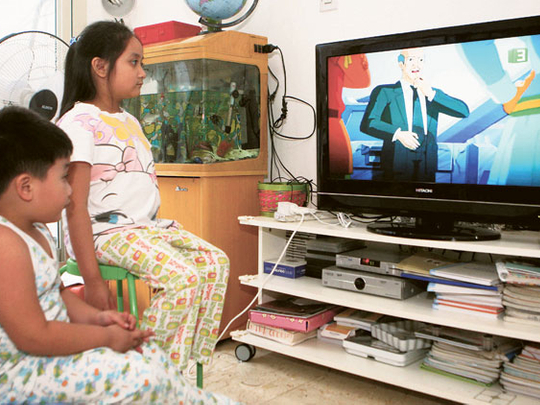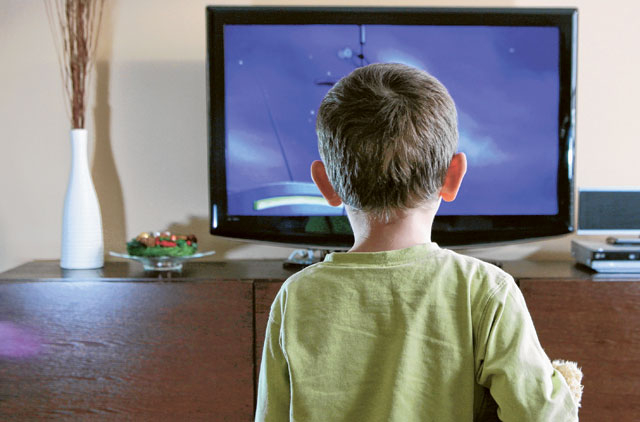
Dubai: When your child can master the adventures of SpongeBob SquarePants — that overly zealous underwater sponge in pants and tie — more than he can recognise his alphabet or put two and two together, you — the parent — should take charge of the remote control.
For Jun, 54, a telephone operator who has lived in Dubai for more than two decades, this realisation came way too late. He is now struggling with his five-year-old son's addiction to cartoons.
"Immediately upon waking up, he would grab the remote control and turn on the TV. But when he sees me watching the news, he'd snatch the remote, switch the channel, and hide the [remote] control somewhere," Jun, father of four, told Gulf News.
Jun's son and seven-year-old daughter are regular viewers of the cartoon programmes of MBC 3, a free-to-air television channel in Dubai. He usually competes for his child's attention when Shaun the Sheep, Cars, Tom and Jerry, and SpongeBob SquarePants are being aired.
While the other cartoons may seem harmless, a recent study published in the journal Pediatrics by the American Academy of Pediatrics found that watching a portion of fast-paced cartoons like SpongeBob had a negative effect on a four-year-old's attention span.
According to the study, a child in the 1970s began watching television at four years old for an average of three to four hours a day. Today, an average child begins to watch television at four months for eight hours a day.
Dr Padmaraju Varrey, senior psychiatrist at NMC Specialty Hospital, said a child's developing brain gets "overloaded' with continuous exposure to fast-paced moving images.
Brain
"Imagine the brain as a big plastic balloon. It stretches as it gets more information. Parents don't see it, but in the long run, repetitive exposure on fast-paced cartoons affects retention, recall, and attention of the child," Dr Varrey told Gulf News. Jun fears that the flak SpongeBob has been getting recently is hitting close to home. "They often struggle with their academics because they're more interested in watching TV than doing their homework. They can't focus because their eyes are fixed on the screen while studying," Jun said.
Expatriate families in the UAE tend to have this problem more according to Dr Varrey. Working parents often leave their child in the care of nannies and television.
"When it's not school season and we're at work, we just tell our kids to watch TV. That way they would not get bored or fight with each other when we're not around," Jun said. The couple would sometimes be away for four to eight hours.
All-day cartoon programming is available in the UAE with Cartoon Network, Nickelodeon, and Disney, among others. In 2010, Cartoon Network launched its Arabic channel with the computer animation Freej, the first Dubai-produced animation about four old Emirati women living in a neighbourhood in Dubai.
At three, Jun's son learned bad words from watching The Simpsons. When Jun banned the show totally, the swearing was replaced by shouting.
"He would often shout at us: ‘You think you're the king of the house?' He would shout at her older sister and punch her after," Jun said.
Yasser, father of three, said his children's behaviour has changed as well. Both families watch the same set of cartoons with Tom & Jerry, an animated cartoon film about the "never-ending cat-mouse rivalry that often involves comic violence," as the common favourite.
"They learned to fight with each other. Because some cartoons have blood and killing, they became more aggressive. They'd hit each other and try to mimic what's being shown on TV," Yasser, an Egyptian financial manager, told Gulf News.
Copycat violence
"There's what we call copycat violence where children imitate the violence that they see on TV. It triggers aggressive behaviour among children," Dr Varrey said.
He cautioned parents to be mindful of the long-term effects of violence on a child. "This aggressive behaviour often leads to bullying in school and at home. When they grow up, they become desensitised to violence and they won't know how to care any more.
"These effects are beyond borders; it's not only in the US or in the UAE. Everywhere we are in the world, we encounter problems with kids who are exposed to too much TV."
Dr Varrey said it is important for parents to take time to sit with their children and watch cartoons with them. "Explain what's happening if necessary. Engage the child in a conversation that way he would understand what's happening."
It is the parents' responsibility to choose programmes that closely resemble reality and not too much of fantasy as children tend to become engrossed in the imaginary world cast by cartoons.
He further reminded parents that when they let talking cars or a sea sponge babysit their kids in the underwater city of "Bikini Bottom," it's their job as parents to exercise control and to bring their children back to reality.
How to take control as a parent
- Take charge of the remote control as early as possible.
- Limit the number of hours a child can watch television.
- Don't mix television time with homework time.
- Monitor the violent images and the kind of language children are exposed to.












